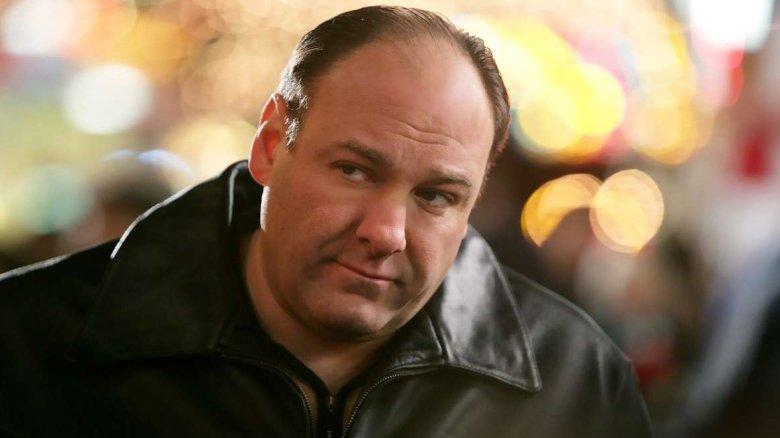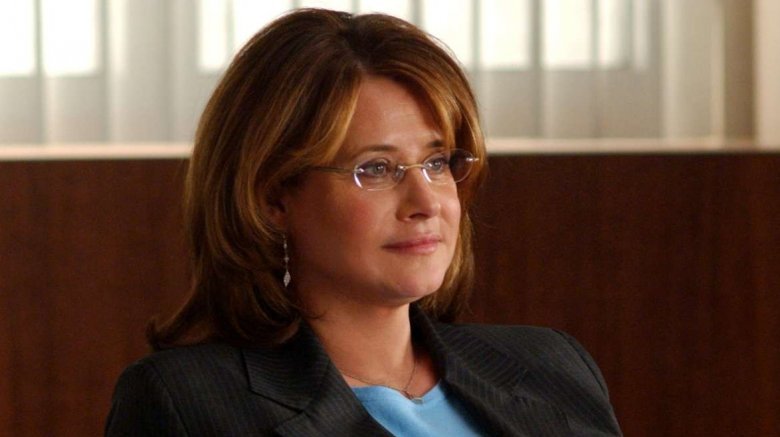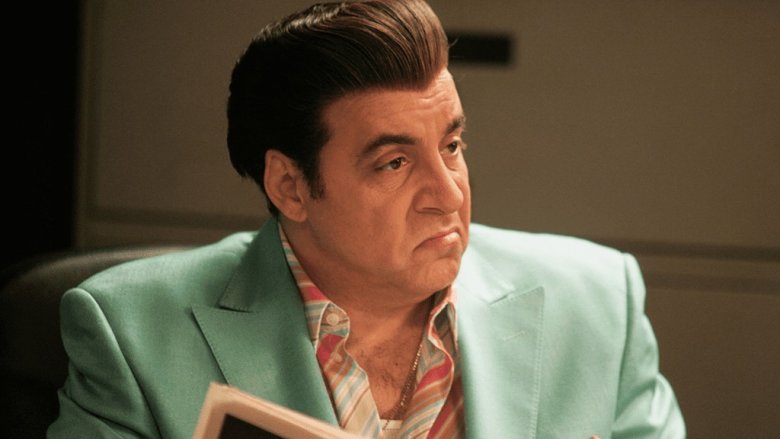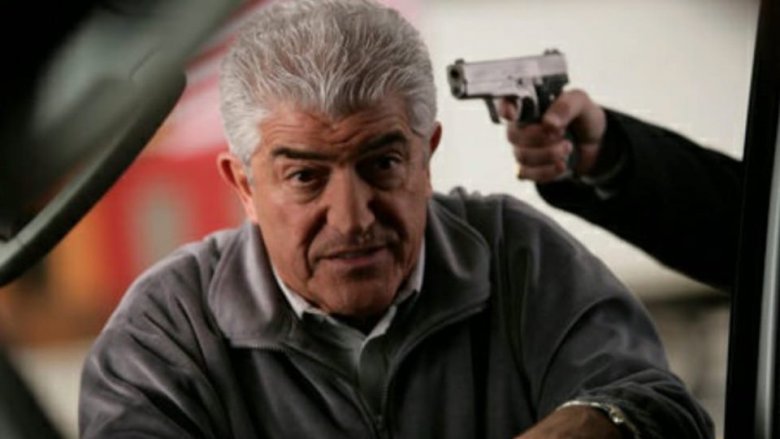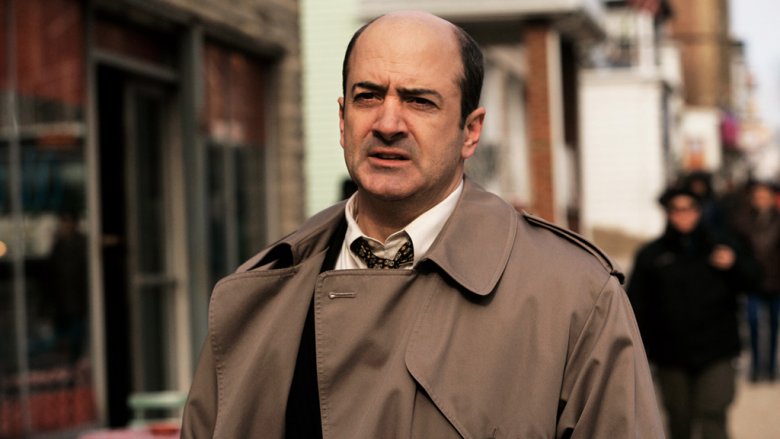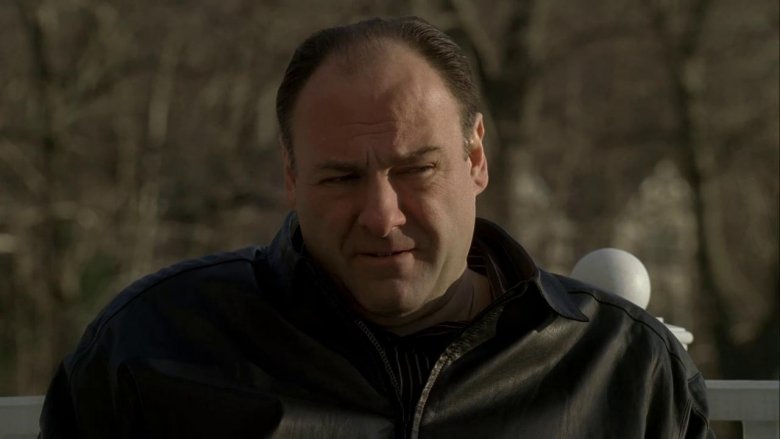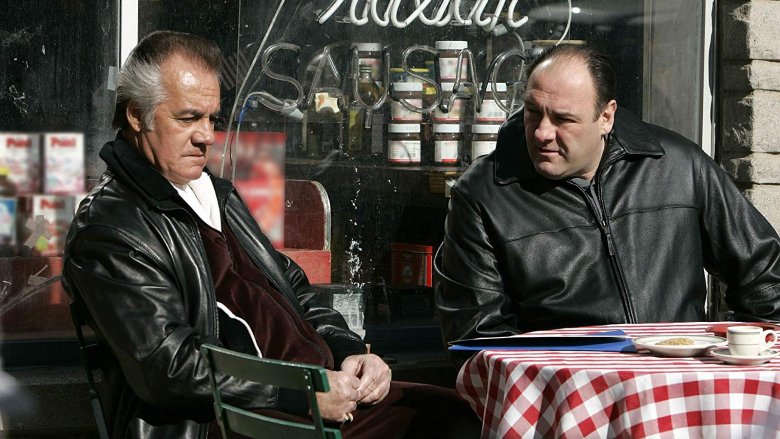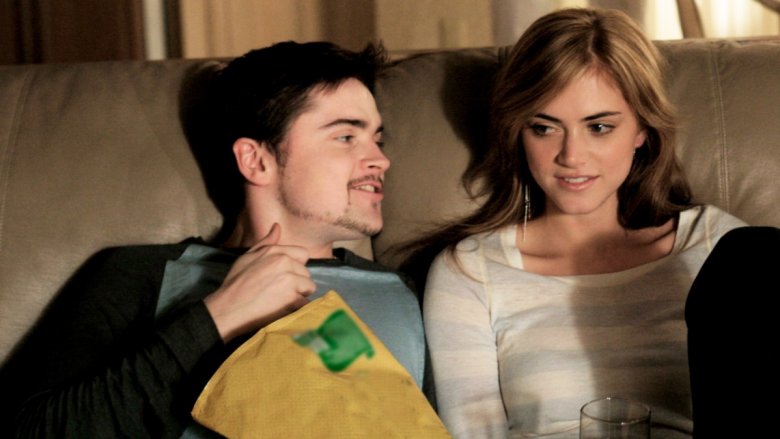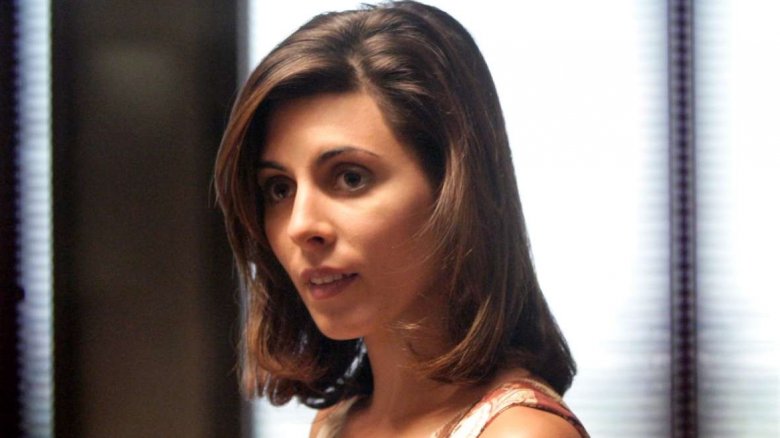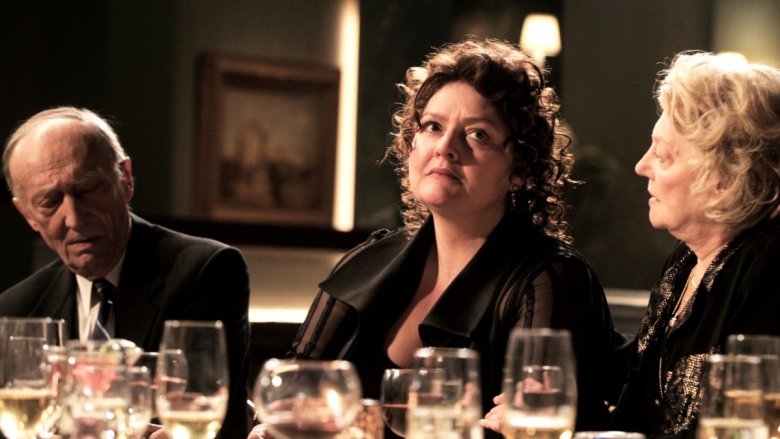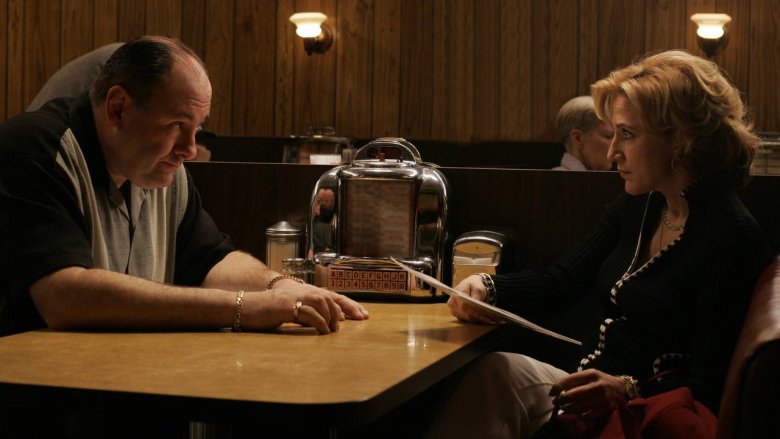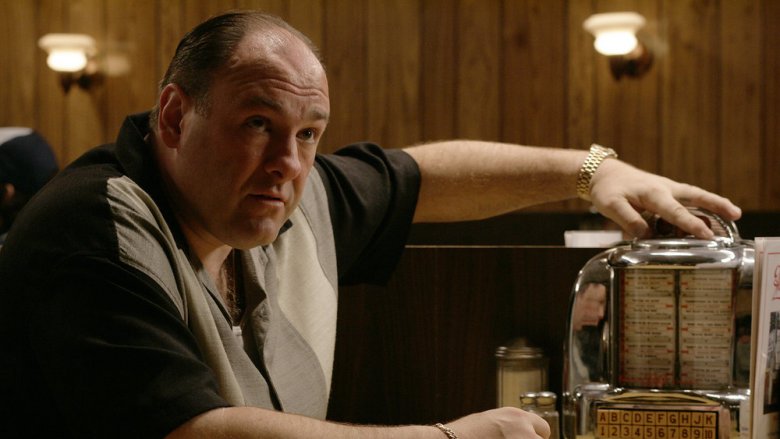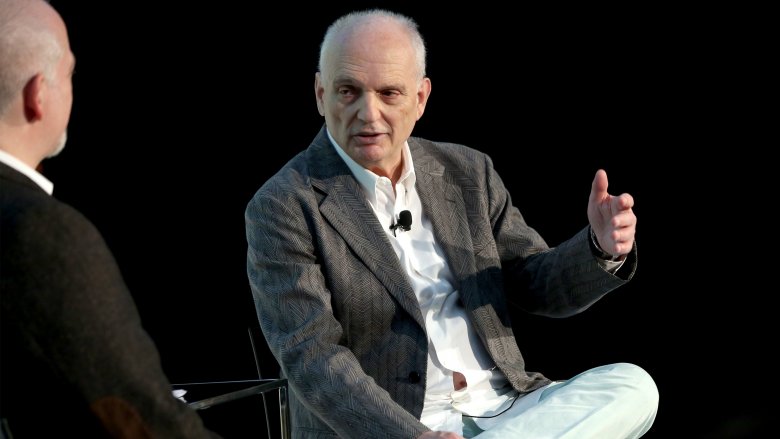We Finally Understand The Ending Of The Sopranos
In 1999, an HBO original series called The Sopranos began with a gangster walking into a psychiatrist's office. What could've been the beginning of a bad joke instead grew into one of the most acclaimed television series of all time.
In the 20 years since its debut on HBO, and the 12 years since the series finale aired, the mythology surrounding The Sopranos has only grown. The show gains new fans year after year, whole books have been written analyzing its thematic and narrative depth, and the series even inspired a prequel movie.
But when most people think about The Sopranos, almost everyone thinks about the ending first. When the last episode, "Made In America," aired in June 2007, it immediately ignited controversy for its abrupt, ambiguous ending. People are still discussing that final shot to this day. But there's more to what went down than just that closing moment. With over a decade's worth of hindsight and discussion, we finally understand the ending of The Sopranos, and we're about to break it all down.
No more therapy for Tony Soprano
One of the most important relationships in The Sopranos, if not the most important relationship, is between mob boss Tony Soprano (James Gandolfini) and his therapist, Dr. Jennifer Melfi (played by Lorraine Bracco). For seven years, the two danced around each other in Melfi's oval office, as the therapist was often entranced and sometimes repulsed by her gangster client. Making things even more complicated, Tony was sometimes in love and sometimes sick of his therapist. Through it all, the personal and professional connection very nearly ended on more than one occasion, but the two always seemed to find their way back to each other.
Then, in the penultimate episode of the series, Melfi comes to a realization after a colleague encourages her to read up on how Tony, as a sociopath, might simply be taking advantage of her. Convinced that he's been using her, Melfi cuts Tony off during a tense final session. Throughout the war with Phil Leotardo (Frank Vincent) and the Lupertazzi crime family, Tony doesn't attempt to call or contact her, and as far as we know, he considers their relationship over, just as she does. If Tony made it out of the series alive, it's possible he would've he looked for similar care at some point in the future, but Melfi seemed hellbent on shutting him out of her life.
A hit job and a fallen friend
Loose ends and uncertain fates are a hallmark of The Sopranos' final season, and nowhere is that more devastatingly evident than in the case of Silvio Dante, the consigliere of the DiMeo crime family and one of Tony's most trusted friends and advisers.
In the penultimate episode of the series, "The Blue Comet," Lupertazzi boss Phil Leotardo is on a quest for revenge and orders a series of coordinated hits against the DiMeo crime family for killing his brother. And sadly, that's when Silvio (played by Steven Van Zandt) is introduced to a couple of bullets. Silvio and Patsy Parisi (Dan Grimaldi) are driving away from the Bada Bing when two men open fire. Patsy starts shooting back and manages to escape, but Silvio is hit several times, and his wounds land him in an intensive care unit.
In the series finale, "Made In America," it's revealed that Silvio is comatose as the result of his wounds, and the doctors don't expect him to wake up. He spends the final episode of the series on life support, and though Tony does visit him in the hospital, the episode ends before we learn anything more about his fate. It seems the second most powerful man in the DiMeo family will live out his final days in a hospital bed, putting a slow end to one of the most compelling supporting characters on the show.
The future of the Lupertazzi Family
Phil Leotardo is no fan of Tony Soprano, but the head of the Lupertazzi crime family spends most of the series finale in hiding, making calls to his underboss, Butch DeConcini (Greg Antonacci), through payphones at Long Island gas stations. But while Butch is one of the most ruthless members of the family, he finally grows tired of Phil's obsession with destroying the DiMeo family. So Butch asks Tony for a sitdown, and while he doesn't offer up Phil's exact location, he does give Tony his blessing to do "do what you gotta do" regarding Phil.
Later in the episode, Phil is spotted by soldier Walden Belfiore (Frank John Hughes) and gunned down outside a gas station. His head is then crushed by his still-rolling SUV, putting a definite end to the Lupertazzi boss. Of course, that doesn't mean the family is dead. By giving Tony permission to kill Phil in pursuit of peace, Butch has effectively made himself acting boss of the family and ushered in a new era for the New York operations. Whether or not that means lasting peace with the DiMeo family in New Jersey, well, that isn't discussed in the finale. But even if somebody does call a truce, Butch has proven himself to be a brutal strategist in the past. He might be content to calm things down for now, but if he sees a business advantage to pursuing more violence, the man will definitely pick that option.
A friend in the FBI
The final season of The Sopranos wasn't just about gangsters, as we also got a lot of FBI Agent Dwight Harris (Matt Servitto). This guy has spent years investigating Tony and the DiMeo family, but still, he's developed a kind of respect for Tony, especially after the mob boss came forward with info regarding Ahmed and Muhammad (Taleb Adlah and Donnie Keshawarz, respectively), two guys who've possibly been financing terror groups through credit card scams.
In "Made In America," Tony tries using more dirt about the Muslim men as leverage to get information about Phil's whereabouts. The FBI agent tells Tony to look for gas stations in Oyster Bay, as he's probably using pay phones because he can't get his hands on a "clean cell phone." When Harris gets word that Phil has apparently died, he momentarily celebrates, indicating a closer bond with Tony than he's willing to admit.
Harris is still an FBI agent, though, and is bound to continue investigating Tony, especially since indictments might be coming down on Tony sometime after "Made in America." That said, Harris has also noted Tony's help with his terrorism investigations, so the fed could provide some valuable leverage and vouch for Tony's character if prison time ever enters the discussion.
Looming legal trouble for Tony Soprano
Tony Soprano has a lot to deal with in the series finale. There's the war with the Lupertazzi family, his daughter's impending marriage, and his son's continued lack of direction. On top of all that, he also has to deal with a new threat of criminal prosecution. The gangster first learns he might be in trouble when it's revealed that Carlo Gervasi (Arthur J. Nascarella), one of his captains, likely started flipping on the family after his son was arrested on a drug charge.
And this isn't just Tony being paranoid. Even his lawyer, Neil Mink (David Margulies), thinks Carlo has turned state's witness, and that it will likely mean indictments for Tony in the form of a gun charge, an interstate fraud charge, and possibly even one for homicide. Tony is frustrated by the news, but Neil assures him that "trials are there to be won," suggesting he's got plenty of strategies in his back pocket if it should come to that.
So does Tony go to jail after the show is over? Is prison looming in his future? We don't know. We don't even know if he has a future. But if Tony made it out of the finale alive, these charges are something he'll have to reckon with on the other side of the Lupertazzi war.
The rise of Paulie Walnuts
The revelation that Carlo Gervasi has disappeared and likely flipped on the family leaves Tony with a power structure problem, one that's further exacerbated by the death of Bobby Baccalieri (Steve Schirripa) and the comatose state of Silvio Dante. In an effort to get things back on track, Tony offers Paulie Gualtieri (played by Tony Sirico) leadership of Carlo's old crew. Paulie initially refuses, citing superstition, but accepts after Tony threatens to make Patsy Parisi — whose family is about to merge with Tony's own through marriage — head of the crew instead.
This job offer, plus Tony's tendency to rely on him above all other family members during the final stages of the Lupertazzi war, places Paulie in a position to be the second most powerful man in the family. He's the most prominent captain in the family, as well as the acting underboss, which would make him the acting boss should anything happen to Tony. The series never explores this storyline further, but it's definitely fun to think about a crime family run by Paulie Walnuts.
What's the future going to be like for A.J. Soprano?
Even in the series finale of The Sopranos, A.J. Sopranos continues his streak of being the family screw-up, long after his sister has seemingly gotten her act together. At least he has a girlfriend now, and their relationship seems to be the only thing he really cares about, especially after his car blows up during a makeout mishap. As A.J. puts it, he feels free now that his car gone, reasoning that he'll reduce dependence on foreign oil by not driving. His already frustrated parents are further irritated when A.J. decides he wants to join the army and go to Afghanistan.
After talking with his therapist and pulling some strings, Tony feels like he's finally got a handle on what to do for his son. In the wake of the truce between families, he gets A.J. a job at Little Carmine Lupertazzi's film production company, and he offers to buy hi son a new car. And since it's not going to be a gas-guzzling SUV, A.J. takes him up on the offer and gets a new BMW. Will this finally be a stable path for A.J.? Well, if past is prologue, then probably not. And that's especially true if his dear old dad actually bites the bullet in the last few seconds of the series.
What's the future going to be like for Meadow Soprano?
After a string of relationships that ended badly, Meadow Soprano (played by Jamie-Lynn Sigler) ends the series on an upbeat note, as it looks like her life is finally coming together. She's finishing up law school, and she's engaged to Patsy Parisi's son, Patrick (Daniel Sauli). Plus, Patrick's firm wants to hire her with a starting salary of $170,000. That's not a bad entry into adult life at all.
Things get a little more interesting when Meadow reveals where she wants to take her law career in the future. She wants to defend groups who are unfairly prosecuted and oppressed by the federal government, and she specifically mentions the Italian-American community as part of her mission. After all, she feels her father is being treated badly over bogus charges, but as she explains her decision to her dad, Tony's face changes. He doesn't want to tell his daughter the truth about his profession, but he knows that if she continues down this road, she's going to learn some very disturbing things about him, her future father-in-law Patsy Parisi, and a lot of other people she grew up around. Whether he tries to head her off or not is anybody's guess, but Meadow's chosen career could mean serious tension for the Sopranos down the line.
Holding a family together
Meadow Soprano isn't the only character with a long and difficult romantic road. Tony's sister, Janice Soprano Baccalieri (Aida Turturro), was married once before we knew her on the series. Then, she got caught up in Tony's world again when she arrived back in New Jersey. She was engaged to Richie Aprile (David Proval), shot him to death, then hooked up with Ralph Cifaretto (Joe Pantoliano), only for Tony to eventually kill him. Dating is rough when you're involved with the mob. Finally, she settled down with Bobby Baccalieri after the death of his wife, only to lose him to a hit at the end of "The Blue Comet."
In "Made In America," Janice is still mourning, but she's already looking ahead to her future in some ways. While talking to Tony about what she'll do next, she mentions that she's determined to keep both her own daughter and her step-children together, despite Bobby's kids wanting to live with relatives. "I'm a good mother," she insists, and while she might have a struggle in front of her, she'll also have help. One of Tony's conditions of the truce with Butch was that Janice be financially compensated for her loss, so while she keeps losing lovers, at least she'll have some dough.
Does Tony live in the ending?
One of the most debated and controversial scenes in Sopranos history — nay, TV history — starts when Tony and his family meet up for dinner. Journey's "Don't Stop Believin'" is blaring over the restaurant speakers, and as the four members of the Soprano family show up for a meal, the tension is becoming more and more unbearable. We move from shady-looking guys sitting at the counter to Meadow struggling to park her car outside. Then, just as his daughter seems to be walking in the restaurant, Tony looks up, and the screen cuts to black.
So ... what happened? Well, there are two basic interpretations, so let's start with the most optimistic. In this version, the cut to black is simply our last moment with Tony Soprano, and we can see that his future will be full of tension and uncertainty. Yeah, the war was won, his kids seem happy, and he's settling in for a quiet meal. But that guy at the counter is shady, anything could've happened to Meadow out on the street, and Tony has to look up every time the bell over the restaurant's door rings because he has to be sure he's not being ambushed. Tony's alive, but he's never safe. If he survives the series, he's going to spend the rest of his days fearing for his life, and that final scene was simply our connection to him being closed off forever.
Does Tony die in the ending?
Sure, maybe Tony Soprano made it out of the show alive ... but it's possible that Tony had his brains blown out in that diner. Chances are good that the screen cuts to black because that's the moment where Tony dies. The sudden cut is his point of view as a character, with the darkness showing that his life has come to an end. There's actually some evidence backing up this theory, as Tony's possible death was foreshadowed earlier in the show. In the season six episode "Soprano Home Movies," Bobby Baccalieri and Tony are chatting about the nature of death, when Bobby theorizes that death is simple, quick, and that "you probably don't even hear it when it happens."
This little line strongly suggests that in Tony's last moments, he didn't hear the bullet the laid him low or even realize he was about to die. And since the scene is essentially from his perspective, we also don't get to hear the gun shot. Perhaps the shady guy in the Members Only jacket went to the bathroom to pick up a gun a la The Godfather, came back out, and shot Tony in the head. We didn't see it because neither did he, and it's possible that one of the greatest characters in TV history was left for dead in that New Jersey diner.
What the writers think about the ending of The Sopranos
So, which is it? Is Tony Soprano alive or dead after that final shot? Series creator David Chase (pictured above) has always remained famously cagey about explaining the scene, and shortly after the last episode aired, he insisted that "no one was trying to be audacious" with the final moment. Chase has been asked several more times to reflect on the ending in the years since the series finale, and each time, he's remained relatively ambiguous in his interpretation. Fans got a little thrill in early 2019 when he referred to a "death scene" for Tony in an interview, but he later clarified that he was referring to an earlier idea that was discarded, and not the final scene that he ended up shooting.
In the end, the best explanation for the scene has perhaps come from Sopranos writer Terence Winter. "My interpretation was that, when you're Tony Soprano, even going out for ice cream with your family is fraught with paranoia," Winter said. "He's sown a life of murder, mayhem and treachery. And everybody who walks in, a guy in a Member's Only jacket ... this could be the guy, or that could be the guy. You're always looking over your shoulder and at some point, whether it happened that night or not, when you live that life, one day, somebody's going to walk out of a men's room, and that's it for you."
